Preparing your skin for the wedding season is an exciting and necessary procedure to guarantee you look your best on your wedding day. This blog will walk you through a comprehensive skincare routine to help you attain a vibrant and flawless complexion in time for the wedding season. Winter is nearly here! The winter season also corresponds with many festivities and weddings. We all want to look our best, especially during the holiday season.
Want bright, spot-free skin before the wedding season?

Persistent skincare practice and healthy lifestyle choices are required to get bright, spot-free skin before the wedding season. Here's a step-by-step guide to achieving glowing, spot-free skin:
-
Begin Early: Begin your skincare routine several months before the wedding to allow for visible results.
-
See a dermatologist: If you have specific skin concerns, such as acne, hyperpigmentation, or acne scars, consult a dermatologist for a personalised treatment plan.
-
Cleansing: Use a gentle cleanser that is appropriate for your skin type. To remove impurities from your skin, cleanse it twice a day.
-
Exfoliation: Exfoliation should be incorporated into your routine to remove dead skin cells and promote skin renewal. 1-2 times per week, use a mild chemical exfoliant (e.g., glycolic acid, lactic acid) or a gentle physical exfoliant.
-
Serum: To target dark spots and brighten your complexion, use a serum containing ingredients such as vitamin C, niacinamide, or alpha arbutin.
-
Sunscreen: Every morning, apply a broad-spectrum sunscreen with at least SPF 30 to protect your skin from UV damage, which can exacerbate dark spots.
-
Spot Treatment: Use a spot treatment including hydroquinone, kojic acid, or licorice root extract if you have specific dark spots. Carefully follow the product directions.
-
Moisturise: To keep your skin hydrated, apply a hydrating, non-comedogenic moisturiser.
-
Eye Cream: To combat dark circles and fine lines around the eyes, use an eye cream containing peptides or retinol.
-
Healthy Diet: Consume a healthy diet that is high in fruits, vegetables, and antioxidants. Foods high in vitamins C and E can help with skin health.
-
Hydration: Drink plenty of water to keep your skin hydrated from the inside out.
-
Sleep: Make sure you get enough quality sleep each night. Sleep is necessary for skin regeneration and repair.
-
Stress Management: To keep stress at bay, use stress-reduction techniques such as meditation, yoga, or deep breathing exercises. Stress can aggravate skin conditions.
-
Lifestyle Choices: Avoid smoking and limit your alcohol consumption, as these habits can have a negative impact on the health of your skin.
-
Professional Treatments: If a dermatologist recommends it, consider professional treatments such as chemical peels, microdermabrasion, or laser therapy.
-
Maintain Consistency: Consistency is essential. Maintain your skincare routine and avoid introducing new products too soon before your wedding.
-
Final Preparations: Make sure your skincare routine is consistent and effective a few weeks before the wedding. To achieve the desired results, receive a final facial or professional treatment.
Your wedding is and should be all about you- the beautiful bride with glowing skin. There are so many things that need to be taken care of before the big day. Taking care of your skin mostly takes a backseat. There’s no denying that good makeup will ensure that you look your best on your wedding day by hiding blemishes or scars. But nothing beats healthy-looking and naturally radiant skin. The months before the wedding are very hectic, and a lot of running around happens. This leaves you with significantly less time to take care of your skin. Therefore, it is crucial to establish a skincare routine that is easy to follow. You can find a lot of salons and clinics offering skin treatments and pre-bridal packages that guarantee glowing skin. But the makeup will work even better if you’ve got healthy skin.
Get personalised skin treatment before the wedding season
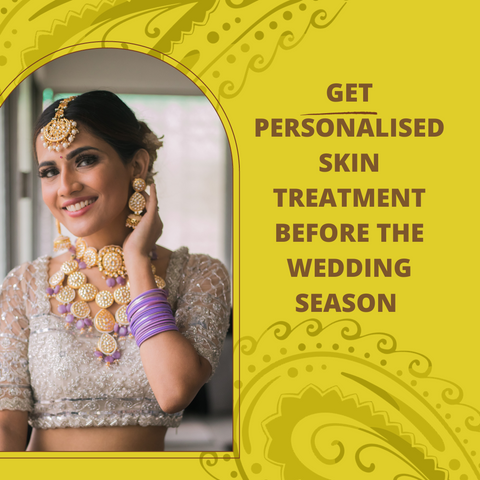
It is highly recommended that you meet with a dermatologist or a licenced skincare specialist before the wedding season to examine your skin's individual needs and build a customised treatment plan. Here's how to obtain personalised skin treatment before your wedding, step by step:
-
Make an Appointment: Make an appointment with a dermatologist or skincare professional at least several months before your wedding date.
-
Consultation: Discuss your specific skin concerns, goals, and any issues you want to address before the wedding during the consultation. Inform your doctor about any allergies or sensitivities you may have.
-
Skin Assessment: The dermatologist or skincare professional will examine your skin to determine its condition, identifying any issues such as acne, hyperpigmentation, fine lines, or texture irregularities.
-
Personalised Treatment Plan: The professional will create a personalised treatment plan based on the assessment and your goals, which may include a combination of topical treatments, chemical peels, microdermabrasion, laser therapy, and botox or dermal fillers.
-
Timeline: Talk about how long your treatments will take. Many treatments necessitate multiple sessions, which must be scheduled in advance to achieve the best results before your wedding.
-
Skincare Routine: Your skincare professional will recommend a customised skincare routine for you, which will include cleansers, serums, moisturisers, and sunscreens.
-
Aftercare and Maintenance: Make sure to follow your aftercare instructions, which may include sun protection and product usage guidelines. Discuss any possible side effects as well as recovery times.
-
Budget: Be clear about the costs of the treatments as well as the expected duration of the treatment plan.
-
Start Your Treatment Plan Now: Begin your personalised treatment plan as directed by your skincare professional. To get the best outcomes, carefully adhere to their instructions.
-
Follow-Up Appointments: Schedule follow-up appointments with your skincare professional as needed. Your treatment plan may be modified based on your skin's response.
Skin treatments take time to show results. Don’t wait for skin/hair problems to worsen. You can book a video consultation from the comfort of your home at just ₹199 and get professional advice and a personalised treatment plan for yourself at Clinikally.
Pre-wedding skincare do's and don'ts

Pre-wedding skincare is essential for looking your best on your wedding day. Here are some dos and don'ts for achieving a glowing complexion:
Do's:
-
Begin Early: Begin your pre-wedding skincare routine several months before the wedding to allow for visible improvements.
-
Consult a Professional: For a personalised skincare plan, consult a dermatologist or licenced skincare professional.
-
Hydrate: Drink plenty of water to keep your skin hydrated from the inside out.
-
Eat a Balanced Diet: Consume a diet high in fruits, vegetables, and antioxidants to promote the health of your skin.
-
Maintain a Skincare Routine: Make sure you follow a regular, daily schedule for cleansing, moisturising, and sun protection.
-
Exfoliate: To improve skin texture and get rid of dead skin cells, use a light exfoliation technique.
-
Use Sunscreen: To prevent UV damage to your skin, apply a broad-spectrum sunscreen with at least SPF 30 every day.
-
Serum: To address particular issues, use a serum that contains active ingredients like niacinamide or vitamin C.
-
Professional Procedures: If a skincare specialist recommends it, take into account professional procedures like chemical peels, facials, or microdermabrasion.
-
Spot Treatment: Use spot treatments as necessary if you have particular concerns, such as acne or dark spots.
-
Healthy Lifestyle: Engage in regular exercise, get enough sleep, and use relaxation methods like meditation to control stress.
Don'ts:
-
Do not Introduce New Products Too Close to the Wedding: To prevent unforeseen reactions or sensitivities, do not use new skincare products too close to the wedding.
-
Never Over-Exfoliate: Using too much exfoliation can cause skin irritation. Stick to the recommended frequency and exfoliate gently.
-
Do not Pick at Your Skin: Picking at acne or blemishes can cause scarring.
-
Do not Overindulge in Alcohol or Processed Foods: Excessive alcohol and unhealthy foods can have an effect on the appearance of your skin. Consume them with caution.
-
Do not Skimp on Sleep: Get enough quality sleep every night to allow your skin to repair and regenerate.
-
Do not Forget Sunscreen: Even if it is cloudy or overcast, always wear sunscreen to protect your skin from UV damage.
-
Do not Stress: Wedding planning can be stressful, but try to manage your stress effectively to avoid skin problems. Acne and other skin conditions can be aggravated by stress.
-
Drink Plenty of Water: Stay hydrated by drinking plenty of water to keep your skin hydrated from within.
-
Avoid Using Harsh Products: Harsh or abrasive skincare products can strip your skin's natural oils and cause dryness.
-
Do not Leave It Until the Last Minute: Plan and begin your pre-wedding skincare routine as soon as possible. Last-minute treatments may not produce the desired outcomes.
Common skincare myths debunked

Several common skincare myths persist, despite the fact that they are founded on misinformation or misunderstanding. Here are some myths that have been debunked:
-
Myth 1: You should always wash your face with hot water. Debunked: Hot water can strip the skin's natural oils, causing dryness and irritation. It's best to use lukewarm water to cleanse your face to avoid this.
-
Myth 2: Every day, skin exfoliation is necessary. Debunked: For most skin types, daily exfoliation can be too harsh and result in over-exfoliation, redness, and sensitivity. At most, two to three times a week should be spent exfoliating.
-
Myth 3: Natural ingredients are consistently efficient and safe. Debunked: Not all natural remedies are safe or effective, even though many natural ingredients have positive effects on the skin. Some natural ingredients can cause allergic reactions, irritation, or other negative side effects.
-
Myth 4: On cloudy days, you do not need sunscreen. Debunked: UV rays can penetrate clouds, and your skin is still vulnerable to UV damage even on cloudy days. Regardless of the weather, wearing sunscreen every day is imperative.
-
Myth 5: You cannot close or open pores. Debunked: Pores are immobile and unable to open or close. The appearance of pores can be reduced with proper skincare, but their size does not change.
-
Myth 6: Skincare Products Must Cause a Tingling Sensation. Debunked: A tingling sensation does not always indicate that a product is effective. In fact, it can be a sign of annoyance. Skincare products should be gentle and easy on the skin.
-
Myth 7: Expensive products are always superior. Debunked: The cost of a skin care product does not always correspond to its effectiveness. There are numerous low-cost skincare options that are effective. What matters is that you find products that are appropriate for your skin type and address your specific concerns.
-
Myth 8: If you have dark skin, you do not need sunscreen. Debunked: UV rays can harm all skin types and tones. People with darker skin can still get sunburned and develop skin cancer. Everyone needs to wear sunscreen.
-
Myth 9: Moisturiser is not necessary for oily skin. Debunked: Moisturising is necessary even if you have oily skin. Skipping moisturiser can result in increased oil production as your skin attempts to compensate for the dryness.
-
Myth 10: To get rid of acne, you must dry out acne-prone skin. Debunked: Drying out your skin can aggravate acne problems. Using harsh, drying products can cause irritation and increase the number of breakouts. It is preferable to use acne-fighting products that are not overly drying.
-
Myth 11: Blackheads are dirt that has gotten stuck in your pores. Debunk: Sebum, or skin oil, oxidises inside the pore to cause blackheads, a type of acne, rather than dirt
-
Myth 12: Your skin will be cleaner the more you scrub. Debunked: Excessive scrubbing can cause skin irritation and damage. Generally, gentle cleansing is sufficient to keep your skin clean.
Understanding the truth behind these skincare myths can help you make more informed skincare decisions and avoid potential skin problems. Always seek personalised advice from a dermatologist or skincare professional based on your specific skin needs.
Ingredients to look for in pre-wedding skincare products
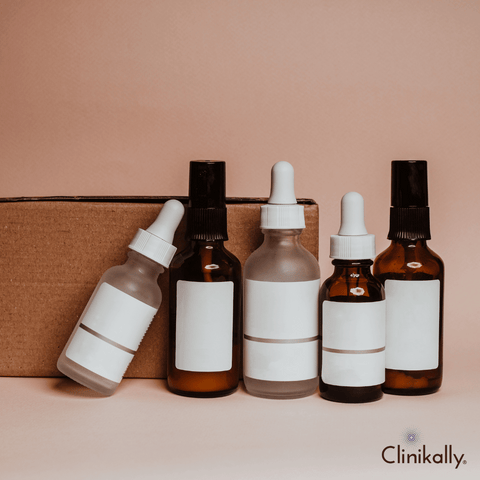
When shopping for pre-wedding skincare, look for substances that can address your unique skin concerns and help you attain a beautiful complexion. The following are some important elements to look for in pre-wedding skincare products:
-
Hyaluronic Acid: Hyaluronic acid is a powerful hydrator with the ability to hold 1,000 times its weight in water. It hydrates and plumpifies the skin, decreasing the appearance of fine lines and wrinkles.
-
Vitamin C: Vitamin C is an antioxidant that helps to brighten the skin, even out skin tone, and reduce the appearance of dark spots and hyperpigmentation.
-
Retinoids (Retinol): Retinoids boost collagen formation, decrease fine lines and wrinkles, and smooth the skin. They can also aid in the treatment of acne and acne scars.
-
Niacinamide (Vitamin B3): Niacinamide reduces redness, improves pore appearance, regulates oil production, and increases skin moisture.
-
Alpha Hydroxy Acids (AHAs): Glycolic acid and lactic acid, for example, exfoliate the skin, improve texture, and minimise the appearance of fine wrinkles and dark spots.
-
Beta Hydroxy Acid (BHA - Salicylic Acid): BHA is an efficient acne treatment that reduces inflammation and unclogs pores. It's fantastic for acne-prone skin.
-
Peptides: Peptides can aid in the stimulation of collagen formation and the reduction of fine lines and wrinkles.
-
Antioxidants: Green tea extract, resveratrol, and coenzyme Q10 are antioxidants that protect the skin from free radical damage and minimise the indications of aging.
-
Ceramides: Ceramides aid in retaining moisture and defend against external stressors by strengthening the skin's natural barrier.
-
Sunscreen (Broad-Spectrum SPF): Sunscreen is essential for preventing UV damage to your skin, which can cause accelerated aging, dark spots, and skin cancer.
-
Aloe Vera: Aloe vera has soothing and moisturising characteristics, making it excellent for calming skin and reducing redness.
-
Licorice Root Extract: Licorice root extract can aid in the fading of dark spots and the evening out of skin tone.
Managing skin stress before the big day
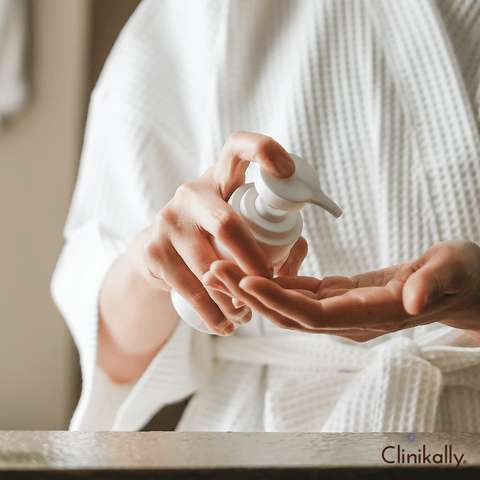
Managing skin tension before your wedding is critical to ensuring your skin looks its best and avoiding undesirable breakouts or irritations. Start early, consult a dermatologist, establish a consistent routine, stay hydrated, maintain a healthy diet, avoid stress, get adequate sleep, exercise, avoid overusing new products, use gentle exfoliation, sunscreen, professional treatments, moisturise, spot treatment, skincare products, stay calm, and avoid picking at your skin. These are some tips to help you manage skin stress before your wedding. You can prevent skin tension and help your skin look its best for your big day by following these guidelines and maintaining a consistent skincare routine. Keep in mind that the sooner you begin your pre-wedding skincare programme, the better the results you will attain.
Essential skincare steps for brides-to-be and grooms-to-be
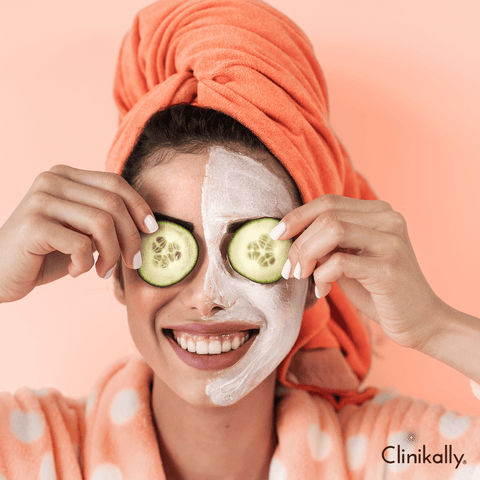
Both brides and grooms-to-be want to look their best on their wedding day, and a strong skincare routine is critical to getting that glowing, healthy complexion. Here are the necessary skincare measures for both:
For Brides-to-Be:
-
Consult a Dermatologist: Plan ahead of time to meet with a dermatologist to discuss any specific skin concerns or conditions you want to address before your wedding.
-
Begin Early: Begin your pre-wedding skincare routine several months ahead of time to allow for visible improvements and potential changes.
-
Create a Routine: cleanse, tone, apply a vitamin C serum (for brightening), moisturise, and apply sunscreen. Cleaning, exfoliating with a gentle exfoliator 2-3 times per week, applying retinol (for anti-aging), moisturising, and using an eye cream are all recommended.
-
Hydration: Drink plenty of water to keep your skin hydrated from the inside out.
-
Healthy Diet: To support skin health, eat a balanced diet rich in fruits, vegetables, and antioxidants.
-
Avoid Stress: Use relaxation techniques such as meditation, yoga, or deep breathing exercises to manage wedding-related stress. Stress can have an impact on your skin.
-
Adequate Sleep: Get enough quality sleep each night so your skin can repair and regenerate.
-
Regular Physical Activity: Include regular physical activity in your routine to improve circulation and overall skin health.
-
Exfoliation: Exfoliate your skin gently 2-3 times per week to remove dead skin cells and improve texture.
-
Sunscreen: Use a broad-spectrum sunscreen with an SPF of at least 30 every day to protect your skin from UV damage. Reapply as needed throughout the day.
-
Professional Treatments: Consider professional treatments such as facials or chemical peels. Plan these ahead of time to allow for any redness or sensitivity to fade.
-
Moisturise: Use a hydrating, non-comedogenic moisturiser to keep skin hydrated and prevent dryness or flakiness.
-
Spot Treatment: Use spot treatments as needed if you have specific skin concerns such as acne or blemishes.
For Grooms-to-Be:
Grooms can benefit from a simpler skincare routine that focuses on the essential steps for healthy, refreshed skin:
-
Cleaning: Begin by cleansing with a gentle cleanser to remove dirt, oil, and impurities.
-
Moisturising: To keep your skin hydrated, use a lightweight, non-greasy moisturiser.
-
Sunscreen: Use a broad-spectrum sunscreen with at least SPF 30 every day, especially if you will be outside for the wedding.
-
Shaving Routine: If you shave, stick to a consistent shaving routine to avoid irritation or ingrown hairs.
-
Healthy Lifestyle: Avoid smoking and excessive alcohol consumption, eat healthily, manage stress, and get enough sleep.
Keep in mind that everyone's skin is different, so the key is to tailor your skincare routine to your specific needs. Consider seeking individualised guidance from a dermatologist or skincare professional. Beginning your pre-wedding skincare programme early provides you the best chance of achieving the results you desire for your special day.
DIY face masks for instant glow
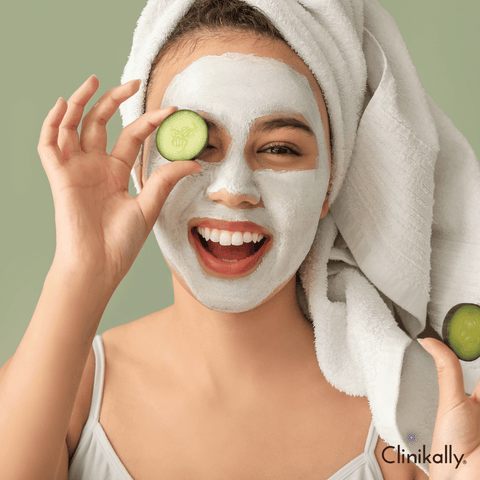
DIY face masks can bring an instant glow to your skin by nourishing and brightening your complexion with natural ingredients. Here are some DIY face mask recipes that can give you an instant glow:
-
Honey and Lemon Mask: 1 tablespoon of honey and 1 teaspoon of fresh lemon juice. In a bowl, combine the honey and lemon juice. Apply the mixture to a clean face and leave it on for 15-20 minutes before rinsing with lukewarm water.
-
Yogurt and Turmeric Mask: 2 tablespoons of plain yoghurt and 1/2 teaspoon of turmeric powder. Make a smooth paste with the yoghurt and turmeric. Allow the mixture to settle on your face for 15-20 minutes. Rinse with cold water.
-
Oatmeal and Banana Mask: 1/2 ripe banana, 2 tablespoons of rolled oats, and 1 teaspoon of honey. To make a paste, mash the banana and combine it with the rolled oats and honey. Leave the mixture on your face for 15-20 minutes. Scrub your face gently while washing the mask off with lukewarm water.
-
Papaya and Honey Mask: 1/2 cup of ripe papaya and 1 tablespoon of honey. To make a smooth paste, mash the papaya and combine it with the honey. Allow the mixture to sit on your face and neck for 15-20 minutes. Rinse with cold water.
-
Strawberry and Yogurt Mask: 2 ripe strawberries and 1 spoonful of plain yoghurt. Strawberries should be mashed and blended with yoghurt. Allow the mixture to settle on your face for 15-20 minutes. Rinse with cold water.
-
Aloe Vera and Cucumber Mask: 2 teaspoons of fresh aloe vera gel and 2 tablespoons of cucumber juice. Combine the aloe vera gel and cucumber juice in a mixing bowl. Leave the mixture on your face for 15-20 minutes. Rinse with cold water.
-
Avocado and Honey Mask: 1/2 ripe avocado and 1 spoonful of honey. Combine the avocado and honey in a mixing bowl. Allow the mixture to sit on your face and neck for 15-20 minutes. Rinse with cold water.
Before using any DIY face mask, perform a patch test to check that you are not allergic to any of the ingredients. Also, for the greatest effects, make sure your skin is clean and makeup-free before applying the mask. If you have sensitive or allergic skin, get the advice of a dermatologist before experimenting with new skincare products or homemade masks.
Benefits of professional skincare treatments
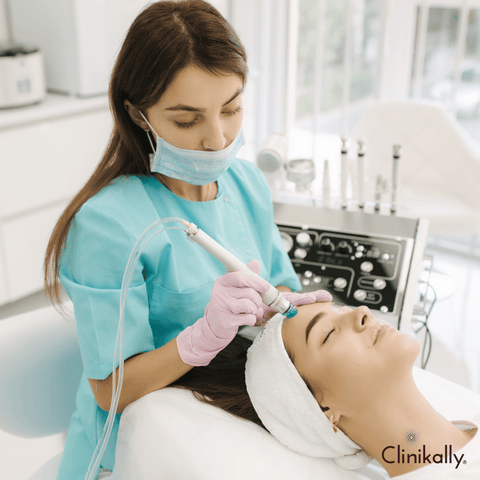
Professional skincare treatments provide numerous advantages for your skin, such as specialised solutions to various conditions and improved results when compared to at-home skincare. Here are some of the most important benefits of expert skincare treatments:
-
Customisation: Skincare professionals can tailor treatments to your specific skin type, concerns, and goals. This tailored approach ensures that your skin receives the attention it requires.
-
Expertise: Skincare professionals, such as dermatologists, estheticians, and skincare therapists, have in-depth knowledge of skin biology, conditions, and the most recent treatment techniques.
-
Advanced Technology: Professional treatments frequently make use of advanced technology and equipment that is not always available at home. This includes lasers, chemical peels, microdermabrasion, and other procedures.
-
Higher Concentration Products: Professional treatments use higher-concentration products, such as chemical peels and serums, which can provide more potent and effective results than over-the-counter alternatives.
-
Safe and Controlled Environment: Professional procedures are carried out in a sterile, controlled setting, which lowers the possibility of complications or infections.
-
Visible Results: Expert treatments have the potential to yield outcomes that are more rapid and obvious. This is especially helpful if you have specific issues with hyperpigmentation, fine lines, acne, or scarring.
-
Benefits Against Aging: Procedures such as chemical peels, microneedling, and laser therapy can increase the production of collagen, which helps to lessen wrinkles and fine lines.
-
Acne Management: Expert treatments provide a quicker and more complete resolution by efficiently addressing acne and acne scars.
-
Reduction of Hyperpigmentation: Chemical peels, IPL (intense pulsed light), and microdermabrasion are among the treatments that can lessen the appearance of sun damage, dark spots, and uneven skin tone.
-
Firming and Tightening: Several procedures, like ultrasound and radiofrequency, can firm and tighten the skin, giving the appearance of younger skin.
-
Long-Term Benefits: Professional treatments frequently have cumulative effects, which means you can continue to improve the appearance and health of your skin with a series of sessions.
-
Skincare Education: In addition to professional treatments, skincare experts can offer advice on efficient at-home routines and product recommendations.
-
Safety: The likelihood of negative reactions is reduced when skilled specialists are supervising your care, guaranteeing your safety.
Before beginning any treatment, it is crucial to speak with a skincare specialist to determine the best course of action for your particular concerns and to assess your skin's needs. Keep in mind that some professional treatments may require multiple sessions for optimal results, so planning in advance is key, especially if you're preparing for a special occasion like a wedding.
Skin Assessment
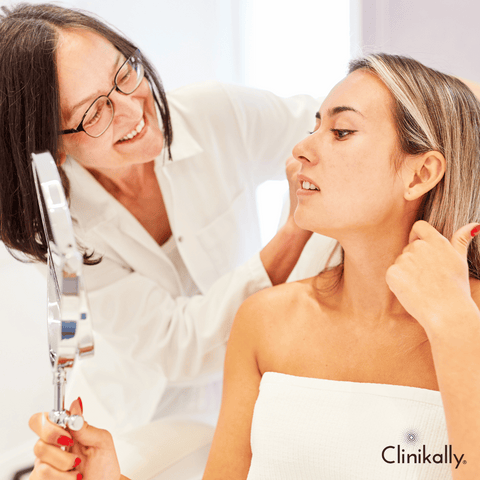
A skin assessment is a thorough examination of the condition, type, and specific problems of your skin. It is usually done by a skincare expert, such as a dermatologist or licenced esthetician. It guarantees that the products and treatments you use are effective and appropriate for your skin type and problems, assisting you in achieving the best results possible. If you're confused about your skin type or have specific skin problems, make an appointment with a dermatologist or licenced esthetician for a professional skin assessment.
Hair Assessment
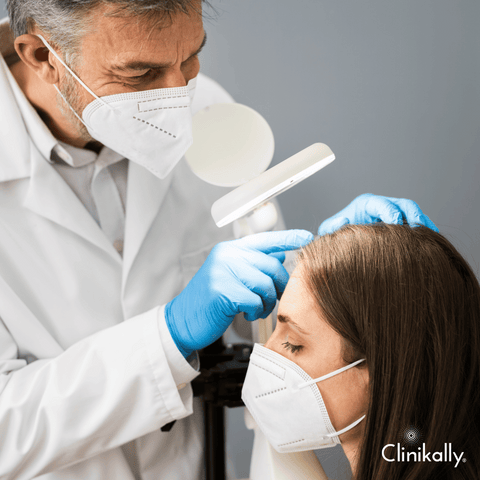
A hair assessment is a comprehensive analysis, typically carried out by a trichologist, hair stylist, or medical professional, of your hair's type, condition, and specific concerns. A hair evaluation determines hair type, assesses hair condition, analyses scalp health, detects hair and scalp issues, evaluates hair texture, assesses hair porosity, measures hair elasticity, discusses lifestyle and hair care habits, sets hair goals, and recommends products and treatments. It guarantees that the products and treatments you use are suited for your individual hair type and issues, allowing you to achieve the greatest results and keep your hair healthy and attractive. If you are unsure about your hair type or have specific hair and scalp issues, consider scheduling a consultation with a hairstylist or trichologist for a professional hair assessment.
DNA Test for Skin and Hair

A simple swab test is typically performed at a clinic or using an at-home DNA testing kit. The swab is then sent to a laboratory, where the genetic components are disassembled and researched to learn about your dominant genes, current collagen and antioxidant levels in your skin, and UV and inflammatory protective factors. Once these characteristics are identified, specialists can help you choose the best skincare products for your skin's needs and provide preventative measures. While DNA tests can provide useful information about a person's genetic proclivities, they are mostly used for medical, genealogical, and ancestry purposes. Some DNA tests, such as those offered by clinikally, can provide information about specific genetic traits, but these traits are usually related to medical conditions or ancestry markers rather than specific cosmetic features such as skin and hair type. If you want to understand your skin or hair characteristics for cosmetic purposes, you should see a dermatologist, trichologist, or licenced esthetician or hairstylist. These experts can visually assess your skin and hair and make recommendations based on their knowledge.
How to get glowing skin at home: Easy skincare routine
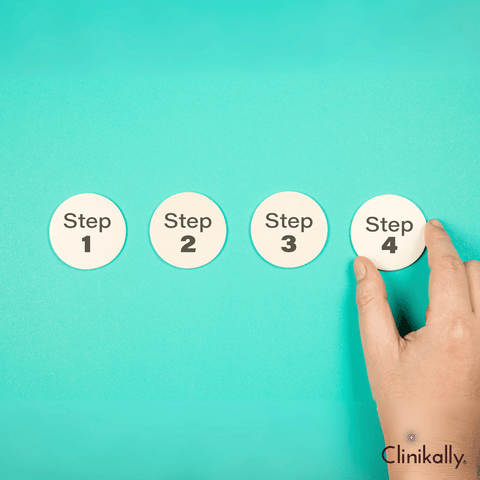
The three essential tips for a skincare regimen include cleansing, moisturising, and protecting.
-
Cleaning the face twice daily is vital to eliminating any residual dirt, oil, and/or makeup from the face. Harsh cleansers do more harm than good. Therefore, it’s essential to use a paraben and sulphate-free cleanser.
-
We keep ourselves moisturised in winter but forget to moisturise in summer. It is necessary to moisturise regardless of the season. The skin becomes soft and supple as the moisturiser helps lock the moisture in our skin cells. Any skin treatment/makeup works better on nourished skin. Use a chemical-free moisturiser for best results.
-
Your skincare routine is incomplete without sun protection. Make sure that you apply sunscreen before you step out. Sunscreen will protect your skin from harmful rays.
Our lifestyle plays a vital role in keeping us and our skin healthy. We should revisit our routine every once in a while to ensure that we eat a balanced diet, drink sufficient water, exercise, and get adequate sleep. Stress can cause and/or worsen many skin problems, such as acne, pigmentation, and signs of aging. Therefore, we should try to de-stress by indulging in recreational activities like meditation and yoga. Every woman deserves to look and feel good on her big day. However, this doesn’t happen most often, as stress leads to an increase in the cortisol hormone, which hampers the skin’s ability to hold on to water, taking away its natural glow and making it look dull. Stress can also cause sleeplessness, causing dark circles and puffiness around the eye. Constant frowning and muscle tension can lead to the appearance of fine lines and wrinkles on our faces.
















